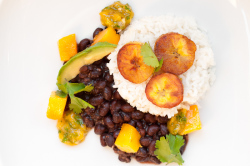It’s not known exactly what causes irritable bowel syndrome, but a variety of factors play a role, some of which are stress, improper digestion, and poor dietary habits. The walls of the intestines are lined with layers of muscle that contract and relax in a coordinated rhythm as they move food from your stomach through your intestinal tract to your rectum, somewhat like a Mexican Wave. If you have irritable bowel syndrome, the contractions may be stronger and last longer than normal, causing gas, bloating and diarrhoea or the opposite may occur, with weak intestinal contractions slowing food passage and leading to hard, dry stools, which are associated with constipation. Excess gas also occurs if you eat too quickly or bolt down your meals, as you are inclined to swallow more air which, of course, turns into gas.
Abnormalities in your gastrointestinal nervous system may also play a role, causing you to experience greater than normal discomfort when your abdomen stretches from gas or stool. Poorly coordinated signals between the brain and the intestines can make your body overreact to the changes that normally occur in the digestive process. This overreaction can cause pain, diarrhoea or constipation. Irritable Bowel Syndrome (IBS) should not be confused with inflammatory Bowel Disorder (IBD). Inflammatory bowel disorder is an auto-immune disease which affects all parts of your digestive tract and as the name implies, is caused by chronic inflammation. The two primary diseases that fall into this category are Crohn’s disease, which can affect the entire digestive tract from mouth to anus and ulcerative colitis which only affect the colon (large intestine). Irritable bowel syndrome (IBS), on the other hand, is a functional bowel disorder and there are no significant physical conditions that contribute to it.
One of your body’s reflexes is the gastro-colic reflex. When you eat, this reflex kicks in and starts a process of movement throughout your entire digestive tract. Large meals and fatty meals appear to cause a greater gastro-colic response and thus may prompt the need for a visit to the toilet. This information is useful for those who are prone to either constipation or diarrhoea. For the person with constipation, a large, fatty meal in the morning may work with the body’s natural biorhythms to encourage a bowel movement. A small meal, on the other hand, would cause a lesser response and that visit to the small room would not be required in as short a period. A person who is prone to diarrhoea should therefore stick to small, low-fat meals. Having diarrhoea can drain away the good bacteria in your gut which, of course, allows the harmful bacteria to flourish. Eating a probiotic such as natural yoghurt should help, more so if you have it with a ripe banana. The time it takes for food to pass through the entire digestive system is known as the transit time and can vary from population to population, person to person, and even the same person can have different transit times depending on the type of food consumed. Transit time is also affected by race, gender, typical diet and physical activity. Normal transit times can vary between 36 hours and 72 hours. Vegetarians have shorter transit times than those who consume meat and sugary foods as plant based foods are digested quicker than dairy products and starches. For vegetarians the transit time can be 24 hours. Transit time of longer than 72 hours can indicate a possible bowel disorder..

Although there are many foods and herbs that can relieve the symptoms of irritable bowel syndrome, it is important to know your dominant symptom and eat accordingly. The main symptoms are constipation, diarrhoea, heartburn, gas, fatigue and gut pain. For gas and bloating, chewing fennel seeds or drinking tea made with fennel seeds can be quite effective as this causes the muscles in the digestive tract to relax, which allows the trapped gas to pass out of the body. Dill, caraway, peppermint, dandelion tea and aniseed can also be used in this manner. Sometimes even a simple glass of hot water will do the trick. Ginger is also effective and can either be consumed as a tea, chewed or added regularly to you cooking with the same effect. Parsley is another herb that can be used and activated charcoal, which works on a different principle, in that it absorbs excess air in the digestive tract as well as toxins which may be contributing to gas problems is also effective. There are a few other ways to address the issue of bloating and gas. You can engage in a full colon cleanse or consume probiotics, especially those that contain pineapples or even eat pineapples themselves. If you have a colon cleanse or colonic irrigation you must remember to re-seed your gut with good bacteria by eating probiotics, bearing in mind that probiotics make up a very large part of your immune system. If you are young and energetic you can lie on the floor on your back, raise your legs and move them as if you are riding a bicycle.
If your problem is constipation then fibre and water are your best friends. Fibre bulks up your stool which speeds up the transit time for food passing through your intestines. You should add fibre gradually as adding too much too soon can lead to gas, bloating and diarrhoea. Water is also essential in helping the passage of fibre through your system. Too much fibre without water can sometimes lead to constipation. Good sources of fibre are fruits and vegetables, especially the skin where possible. Remember also that there are two main types of fibre, namely, soluble and insoluble and they perform different functions in your intestines. Soluble fibre bulks up your stool by absorbing water which prevents constipation and eases the passage of the said stool through the intestine for ease of elimination. It also helps reduce cholesterol. Good sources are brown rice, oatmeal, apples, pears, grapefruit and sweet potato (insoluble as well), Insoluble fibre passes through the intestines undigested and helps to keep the colon clean. Good sources of insoluble fibre are grated coconut, lentils, chick peas, beans, pulses, okra, plantain, sweet potato and green bananas. It is also important that you eat small meals regularly rather than a couple of large meals each day as taking in too much food at once can overstimulate your digestive system.
Reducing simple carbohydrates such as sugar, pasta, white bread, fruit juices and dried fruit is essential in treating the symptoms of irritable bowel syndrome as high glycaemic carbohydrates, such as these, tend to ferment in the gut when the digestive system is out of balance leading to gas and bloating. You should also keep away from spicy foods as they can sometimes make your large intestines go into spasms which can cause diarrhoea. Avoid caffeine as this can worsen irritable bowel syndrome by irritating your intestines and you should also avoid foods like Brussel sprouts, broccoli and cabbage as they cause gas.
Needless to say you should reduce your intake of fried foods, processed foods, meats, certain cooking oils such as canola, vegetable and soy, margarine, dairy products and other fatty foods as these can cause your colon to contract violently which can lead to diarrhoea and abdominal pain. Finally, five good aids to reduce the frequency and severity of irritable syndrome are rest, avoid stress, take a good probiotic, drink good clean water and engage in home cooking.
